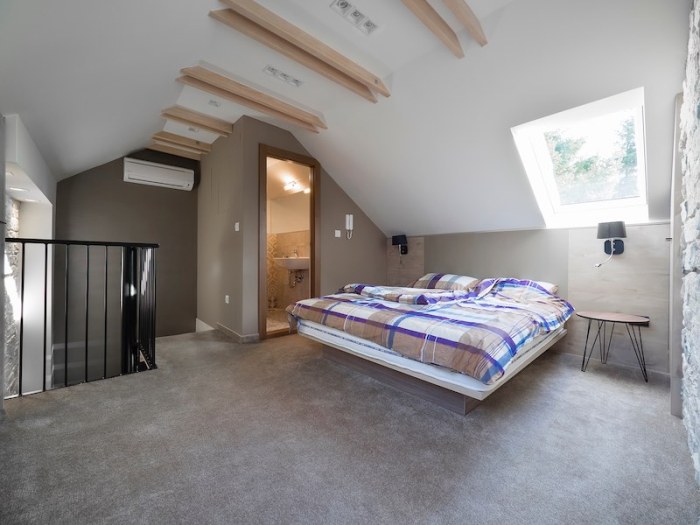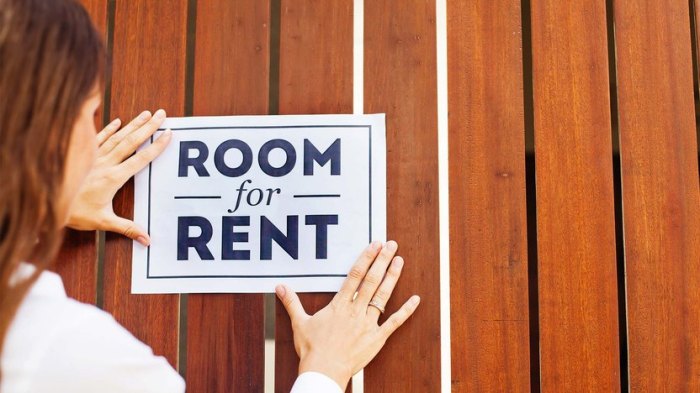Rent for Room in House A Comprehensive Guide
Room Rental Market Overview
Rent for room in house – The market for renting rooms in houses is a dynamic and ever-evolving sector of the rental industry. Understanding current trends, legal requirements, and effective management strategies is crucial for both landlords and tenants. This guide provides a comprehensive overview of key aspects involved in successfully navigating this market.
Room Rental Market Trends
Current trends in the room rental market reflect a growing demand for flexible and affordable housing options, particularly in urban areas. The rise of remote work and co-living arrangements has fueled this growth. Successful landlords leverage online platforms, high-quality photography, and detailed property descriptions to attract tenants. They also emphasize amenities and community building to enhance the tenant experience.
For example, landlords offering furnished rooms with utilities included often command higher rents. Marketing strategies such as showcasing the proximity to public transportation, local amenities, and highlighting a strong sense of community within the shared house are also effective.
| Neighborhood | Average Rent | Amenities | Distance to City Center |
|---|---|---|---|
| Downtown | $1200 – $1800 | Furnished, Utilities Included, Shared Kitchen/Bathroom | 0.5 – 2 miles |
| Suburbs | $800 – $1200 | Unfurnished, Shared Kitchen/Bathroom, Parking | 5 – 10 miles |
| University Area | $900 – $1500 | Furnished, Shared Laundry, Wi-Fi | 1 – 3 miles |
| Rural Area | $600 – $900 | Unfurnished, Private Bathroom, Parking | 10+ miles |
Legal and Regulatory Requirements for Room Rentals
Legal compliance is paramount when renting rooms in a house. Landlords must adhere to local and state laws regarding tenant rights, lease agreements, and safety regulations. Proper documentation protects both landlords and tenants. Different tenancy agreements, such as month-to-month or fixed-term leases, have distinct implications for both parties.
- Secure necessary permits and licenses.
- Comply with fair housing laws.
- Use standardized lease agreements.
- Maintain detailed records of transactions.
Effective Tenant Screening and Selection

Source: legaltemplates.net
A thorough tenant screening process is essential to ensure a positive living environment. This involves verifying income, employment history, and rental history. Key criteria for selecting suitable roommates include compatibility, cleanliness, and respect for shared spaces. Asking specific questions during the screening process helps assess these characteristics.
- Obtain applications and background checks.
- Verify references and employment history.
- Conduct in-person interviews.
- Review credit reports (where legally permissible).
Essential questions to ask potential tenants include their lifestyle preferences, work schedules, and expectations for shared living spaces.
Finding a room for rent in a house can be a great way to save money and meet new people. If you’re looking for more options, you might consider exploring entire houses for rent, and a good place to start your search is with listings for lincoln nebraska houses for rent , which can give you a broader idea of rental costs in the area.
This can help you determine a fair price when negotiating rent for a room in a shared house.
Optimizing Room Rental Listings
Creating compelling online listings is crucial for attracting potential tenants. High-quality photos showcasing natural light, spaciousness, and clean lines are essential. Highlighting unique features, such as a private balcony or updated bathroom, further enhances the appeal. A well-written advertisement should clearly Artikel key features and benefits.
One photograph should emphasize natural light flooding the room, showcasing its spaciousness and clean lines. Another photo should highlight a unique feature, for instance, a private balcony overlooking a garden or a recently renovated, modern bathroom.
A sample advertisement might read: “Charming furnished room in a vibrant neighborhood, close to public transport and local amenities. Includes private balcony, shared kitchen and laundry. $1,000/month. Serious inquiries only.”
Managing Tenant Relationships, Rent for room in house
Effective communication is vital for maintaining positive tenant relationships. Establishing clear house rules and guidelines promotes a harmonious living environment. Procedures for handling conflicts or disputes should be established upfront and clearly communicated. Regular communication, whether through shared online platforms or face-to-face interactions, helps maintain a healthy atmosphere.
Example house rules might include quiet hours, guest policies, and procedures for cleaning shared spaces. A clear process for resolving conflicts, perhaps involving mediation, should be Artikeld in the house rules.
Financial Considerations for Room Rentals

Source: rdcpix.com
Calculating rental income and expenses is crucial for sound financial management. This involves factoring in mortgage payments, utilities, property taxes, and maintenance costs. Understanding potential tax implications, such as deductions for depreciation and expenses, is also important. A detailed budget helps track income and expenses.
A simple income calculation would subtract total expenses (mortgage, utilities, repairs, etc.) from total rental income to arrive at net profit. Tax implications vary depending on location and specific circumstances, so consulting a tax professional is recommended.
Safety and Security Measures for Room Rentals
Prioritizing safety and security protects both landlords and tenants. This involves installing smoke detectors, carbon monoxide detectors, and adequate locks. Strategies for preventing property damage and theft, such as providing clear guidelines and security systems, are also crucial. Clear emergency procedures should be communicated to all tenants.
Emergency procedures might include contact information for emergency services, the landlord, and a designated neighbor. A detailed plan for fire evacuation, including designated meeting points, should also be established.
Roommate Compatibility and Conflict Resolution
Finding compatible roommates is crucial for a harmonious living environment. Utilizing online platforms designed to match roommates based on lifestyle and preferences can be helpful. Fostering open communication and establishing clear expectations can prevent conflicts. Addressing conflicts promptly and fairly, potentially with the help of mediation, is crucial.
Different approaches to finding compatible roommates include online roommate matching services, utilizing social networks, or asking existing tenants for recommendations. Establishing a clear communication channel, perhaps a shared group chat or regular meetings, is vital for fostering a positive environment.
General Inquiries: Rent For Room In House
What is the average length of a room rental agreement?
Lease terms vary widely, but common durations include month-to-month, 6 months, or 1 year. The specific timeframe depends on local laws and mutual agreement.
How do I handle security deposits?
Security deposits are usually equal to one or two months’ rent. Local laws dictate how and when these deposits must be returned to the tenant after the lease ends.
What are my responsibilities as a landlord regarding repairs?
Your responsibilities vary by jurisdiction, but generally include maintaining the habitability of the property, addressing major repairs promptly, and handling emergencies.
What are the tax implications of renting out a room?
Rental income is generally taxable. Consult a tax professional to determine the specific tax implications based on your circumstances and local regulations.




















